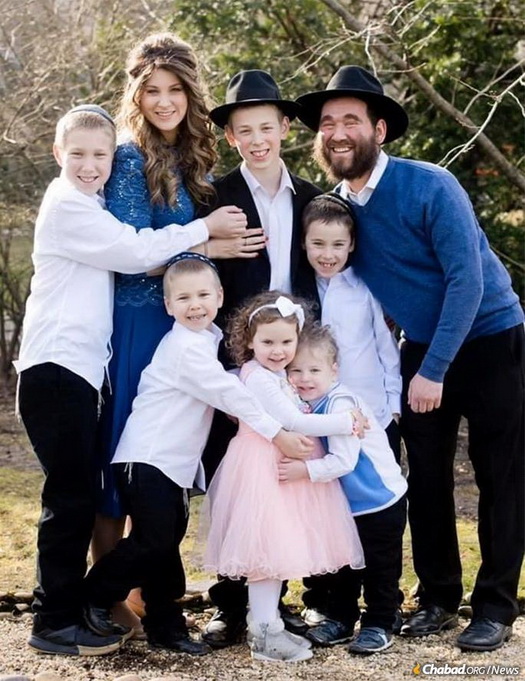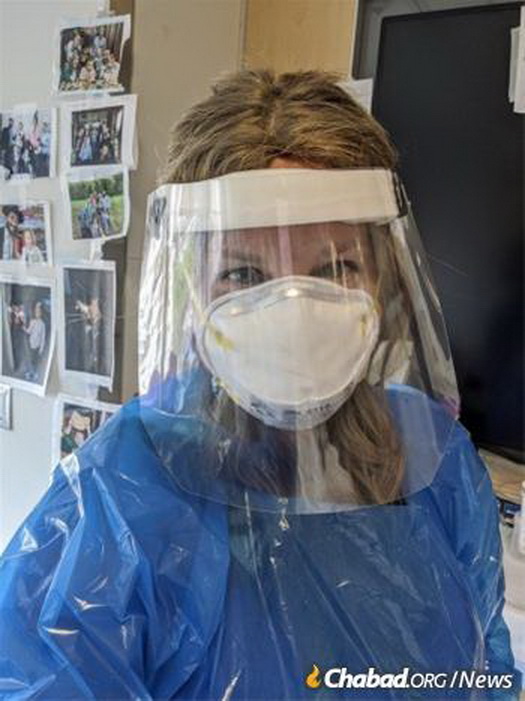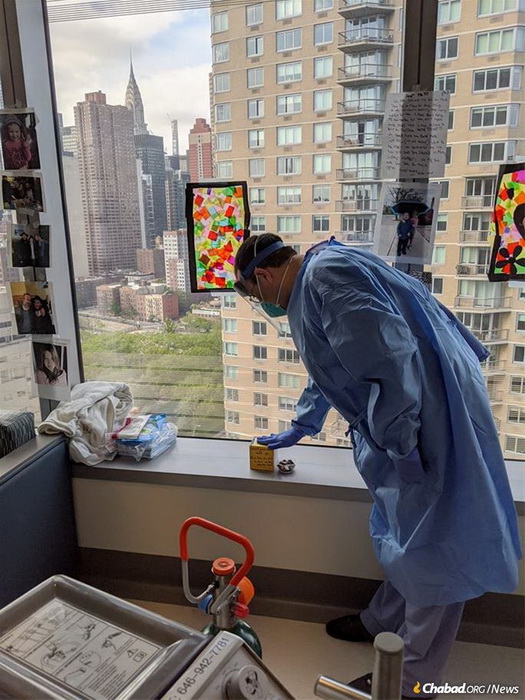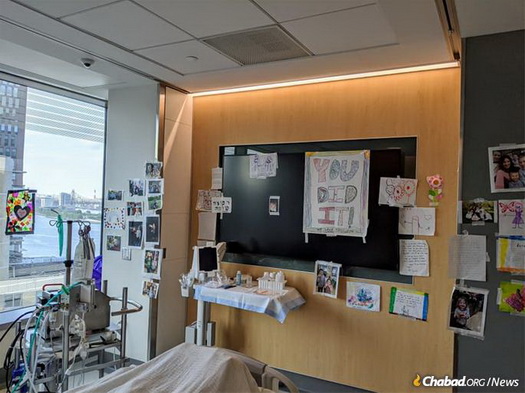
After Months in a Coma, COVID-19 Miracle Patient, Rabbi Yudi Dukes, Gives Thanks
by Menachem Posner – chabad.org
After COVID-19 sent him to the intensive care unit for more than five months, most of them spent in a coma, Rabbi Yudi Dukes, founder and director of JNet, the Jewish Learning Network, is on his way to rehab.
Grateful for the miraculous turn of events and eager to share the inspiration that has kept him going, Dukes speaks candidly about his ordeals, his aspirations, and what he misses most about “real life.”
Conducted via video call, this exclusive interview took place in several installments, as the rabbi frequently took breaks to welcome nurses and other visitors into his room. Plastered with children’s artwork and faith-themed posters, the airy hospital room has a cheery and inviting feeling, the kind of place where one would love to sit and chat with a good friend—something that after months of silence, now takes place on an hourly basis.
But Dukes does more than just banter. To him, every interaction is an opportunity to uplift and inspire others. Every doctor, nurse, and well-wisher who enters the room is encouraged to put some money in a pushke, a charity box, whose contents are earmarked for the needy. He also uses his newly regained ability to speak to share the lessons he has learned from his hospital experience.
Question: Hi Yudi! How are you feeling?
Answer: If you really want to know, I will tell you that today was a tough morning. My IV was really hurting me. But that’s really not significant. I’m excited to share that I just finished my physical therapy and have been working hard on standing up from a sitting position, which I am still not able to do on my own. The great news is that once I was up I walked 72 feet down the hallway with the help of a walker. Pretty good for a guy who wasn’t able to lift a finger just a few weeks ago. Thank G‑d!
In general, I am in great spirits and I make sure that everyone who visits me feels the same. It feels great to know that I am not in critical condition and that I am on my way to rehab, which is one step closer to finally getting home!
Question: You were in a coma for months before finally waking up. What was that like?
Answer: It’s really a haze to me, and I have no recollection at all from the time that I was intubated until I finally woke up when my wife was allowed to visit me. When I thanked my doctor, Dr. Pedro Rivera, for being G‑d’s agent to save my life, he was so humble. He told me that it was a group effort and that the best thing he did for me was allow my wife, Sarah, to visit me. Once she came, everything turned around and I started my bumpy road to recovery.
I feel like G‑d granted me a second lease on life, quite literally. So as I learn to live again, I am like a baby discovering the joys of life once again. The taste of water on my parched tongue, the sensation of moving—these are all new things that I get to appreciate once again.
I always knew that these were gifts from G‑d, but now I feel that viscerally as an absolute reality in my life.
Question: You mentioned tasting water for the first time. What food did you miss most, and what do you eat now?
Answer: For the many months before I had my first ice-chip my mouth was drier than dry. All I wanted was a sip of water. Now I am on a nectar diet, so everything I drink is thickened and the food I eat is mostly pea-soup and smoothies since I am not able to handle anything more solid than that for now.
When I make the morning blessings thanking G‑d that I can open my eyes, get up and walk etc., I experience every blessing in a way I never did before.
Question: Excuse me if this is too personal, but what was the hardest part of this entire experience for you?
Answer: There has been a fair share of physical pain, more than one person should experience in a single lifetime. After I woke up, I kept on getting fevers for two weeks and I was wrapped in a sort of cooler, so I was shivering and hot for two weeks straight. That was hard.
Most recently, I had a hole in my lung which needed to be closed up. The doctors did that by injecting it with a liquid that irritated it to the point that it developed new scar tissue. The procedure was a success, and the hole was covered, but it was off the charts pain until that happened. Every moment I was just counting down to the next one, hoping the pain would end.
Yet, without a doubt the hardest part is not being able to be a parent to my children or a husband to my wife. I have always been a super-present family man and it’s very painful to know that they have suffered so much and that I have not been there to help them as usual. Instead of being a giver, I have become a taker.
At the same time, I know that my wife and I have been picked by G‑d for this special experience and that this is how we can contribute right now. Even though I am dependent on others for so much, I can give them a smile, an encouraging word and a bit of the faith that I have been given.
Question: There is no doubt that your journey has been a group effort, and that many people have gotten you to where you are today. Who are some of the heroes to whom you are most grateful?
Answer: Without a doubt the hero of this saga is Sarah. With superhuman strength and supreme faith, she managed to care for a very sick husband and six lively children for months on end. She has kept us all afloat and continues to be my rock. G‑d alone knows how she does it all.
Our parents and siblings have also been incredibly helpful, taking in our children and doing other things for us.
There are really so many people who have stepped up in the most amazing ways.
Our community in Cedarhurst, where we live, Crown Heights, where we used to live have helped us in ways that I really don’t even know. Rebbetzins Chanie Wolowik and Hadassah Geisinsky held down the fort for us. The same goes for the many people at Chabad Lubavitch Headquarters, where I work. And so many people we never met have been helping our family through this period, and I know that many more will continue to help us.
The Jewish nation is a beautiful family, and we have seen the strength of our giant extended family.
In the hospital, all the doctors, nurses, and other staff are amazing, and I now consider them dear friends.
I have been blessed by the presence of three amazing nurses, Rachel Greenblum, Doba Tiefenbrun and Bruria Eisner, who visited me throughout my long coma, even though I was not even their patient. They would put their phones near my head and call home so my children and wife could take to me and play music for me (my wife is an award winning pianist and composer).
They and their families have become lifelong friends of ours.
Rafi Kurtz is another hospital angel of ours. Even while I was sedated, he came to visit, put on tefillin with me, and advocated in any way he could.
Question: How do you find meaning and purpose now that you cannot do so much of what you once did?
Response: First of all, I plan on getting better, so this is just a temporary stage I need to get through so that I can get back to doing what I have been doing all along.
But until that happens I keep a very positive attitude. I see my stay here like an amusement park. Every bump in the road is a roller coaster I get to experience. My perspective is that nothing happens to you, they happen for you.
And the truth is that I can do many meaningful things. I record weekly Torah messages that get sent to thousands of people. I know that those messages uplift others, and I know that sharing my story can inspire others to have this same perspective.
Instead of spreading a virus, I can spread goodness.
Question: Now that going home is closer on the horizon, what are you looking forward to most?
Answer: Without a doubt, spending time with my family.
Question: In what way will life be different for you after you recover?
Answer: I will be a stronger person with more faith. I hope that I will also maintain this positive attitude that has helped me through here in the hospital.
One thing that has become more real for me is the chassidic notion that moach shalit al halev, that the mind rules the heart. If we set our minds to it, we can accomplish nearly anything. I see this now. When my breathing gets too fast, I can tell myself to slow down, and it slows down. I look forward to applying this to other areas of my life as well.
I also refined my knack for finding Torah lessons in whatever happens to me. This is applicable in all times and in all places and I look forward to continuing to see life through this lens.
Question: Most of our readers know you as the director of JNet, which connects people for weekly sessions of Torah study over the phone. How has JNet been faring in your absence?
Answer: I did not know it at the time, but just before I took ill I hired a talented young man, Rabbi Levi Meijers, who has since stepped up to act as director of JNet. He, together with Chani Denburg and Aidel Zirkind have done a wonderful job at keeping JNet functioning and growing. New study pairs are forming every day, and I am so proud of what we have accomplished!
Question: Do you have any final words for our readers?
Answer: Yes! I would tell them that the one thing we must do is believe more. Believe in ourselves, believe in our loved ones, believe in our communities, and believe in G‑d. This belief is what creates the vessel into which G‑d can pour His healing, His faith, and His sustenance. We just need to try it!
Friends of the Dukes family are running a two-day campaign to support them on their road to recovery. The campaign can be accessed here.
This article has been reprinted with permission from chabad.org


















